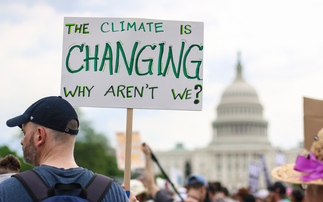With 57 days to go until the UK is scheduled to leave the EU, Theresa May's Green Brexit pledges remain as vague as ever
One of the many problems with Brexit is that it is just too damn big. There are too many components, too many inter-locking scenarios, too many risks, and not enough opportunities. It is, quite honestly, too complicated.
I would wager you would not have to walk around SW1 for long before finding a parliamentarian who has not actually read the 585-page Withdrawal Agreement. You could walk for days before finding someone who actually understands it.
Brexit is the living resurrection of the Schleswig-Holstein Question, which famously prompted British Prime Minister Lord Palmerston to observe that "only three people have ever really understood the Schleswig-Holstein business - the Prince Consort, who is dead - a German professor, who has gone mad - and I, who have forgotten all about it".
The net result of this inherent complexity is that a media and political class with the attention span of a toddler and a testosterone-fueled contempt for the dread phrase "I don't understand" focuses on one Brexit-related issue at a time before flitting on to the next crisis.
As such, this week's parliamentary drama was all about the Irish Backstop and the government's latest credibility-torching attempt to get it renegotiated. A gambit that looks doomed to failure and either increases the chances of the ERG caving and backing May's deal, the chances of the deadlock finally being broken by a second referendum, or the chances of a 'no deal' economic crash, depending on your point of view.
Consequently, other important issues passed without comment, which is unfortunate because there is a lot of critical Brexit-related challenges that remain worthy of attention.
Most notably, May provided a further hint that she was willing to legislate to reinforce the Withdrawal Agreement's existing pledges to maintain and strengthen environmental and workers' rights protections.
"We must and will embed the strongest possible protections on workers' rights and the environment," she said. "And the government will not allow the UK leaving the EU to result in any lowering of standards in relation to employment, environmental protection, and health and safety. And furthermore we will ensure that after Exit Day the House has the opportunity to consider any measure approved by EU institutions that strengthens any of these protections."
She added that the government would "consider legislation where necessary to ensure these commitments are binding, and to this end we are having further talks with the trade unions and MPs across the House in the coming days to flesh out exactly how we can ensure their concerns on these fronts are met".
On the face of it this sounds quite encouraging. It looks like a pretty unequivocal pledge to incorporate some form of non-regression lock on environmental and workers rights standards, drastically increase the likelihood of future UK rules moving in lockstep with the EU, and put these commitments on a legislative footing.
And yet, as with so many of May's supposedly clear commitments, on closer inspection the precise pledges get murkier and murkier.
How is 'strongest possible protections' defined? This government won't allow a lowering of standards, but what of future governments? What are the criteria for determining whether or not legislation is 'necessary'?
In a precise mirror of the Irish Backstop problem, May is offering vague assurances knowing full well that as soon as she tries to flesh out the detail the usual suspects on the backbenches and in the cabinet will Kick. Off.
The government has mapped out a Green Brexit plan that looks better than many green businesses and campaigners first feared. But as soon as it tries to turn it into legislative reality the Treasury moves to water down proposals for new targets and watchdogs, Liz Truss aims potshots at Michael Gove's new found love of regulation, and backbenchers again float their proposals for axed carbon prices and chlorinated chicken trade deals.
May's latest comments confirmed that with just weeks to go until Brexit Day the government is still a long way from finalising how it will deliver a genuinely Green Brexit and is only now talking to other parties, trade unions, and businesses about what is required. You have to ask what the hell has been going on these past two years?
May insisted her "message to Britain's workers in factories, offices, warehouses, and right across our country is that you can rest assured that the government will deliver for you". It was delivered without the faintest flicker of awareness that it was the actions of her government that has left them so fearful in the first place.
All the focus is currently on the Irish Backstop, but the harsh truth is that much of the rest of the agreement is also an In No Way Hot Mess. And that's before we get into the really controversial question of how a new trade deal will work, with its inevitable regulatory convergence, dispute resolution, and penalty mechanisms. If the Tory Brexiters are worried about sovereignty currently someone should really tell them what comes next if they want the continued access to the world's largest market that they promised would not be disrupted.
The EU environmental rules they hate so much are going to remain hugely relevant for the UK for a very long time to come, regardless of what happens in the coming weeks.
May's commitment to environmental protections is welcome, but it remains distressingly vague given how close we are to the supposed deadline. I don't understand how the government has allowed itself to get to this point, nor where it goes next - and I don't mind admitting it.
This post first appeared as part of BusinessGreen's exclusive daily Overnight Briefing, which is available to all subscribers










